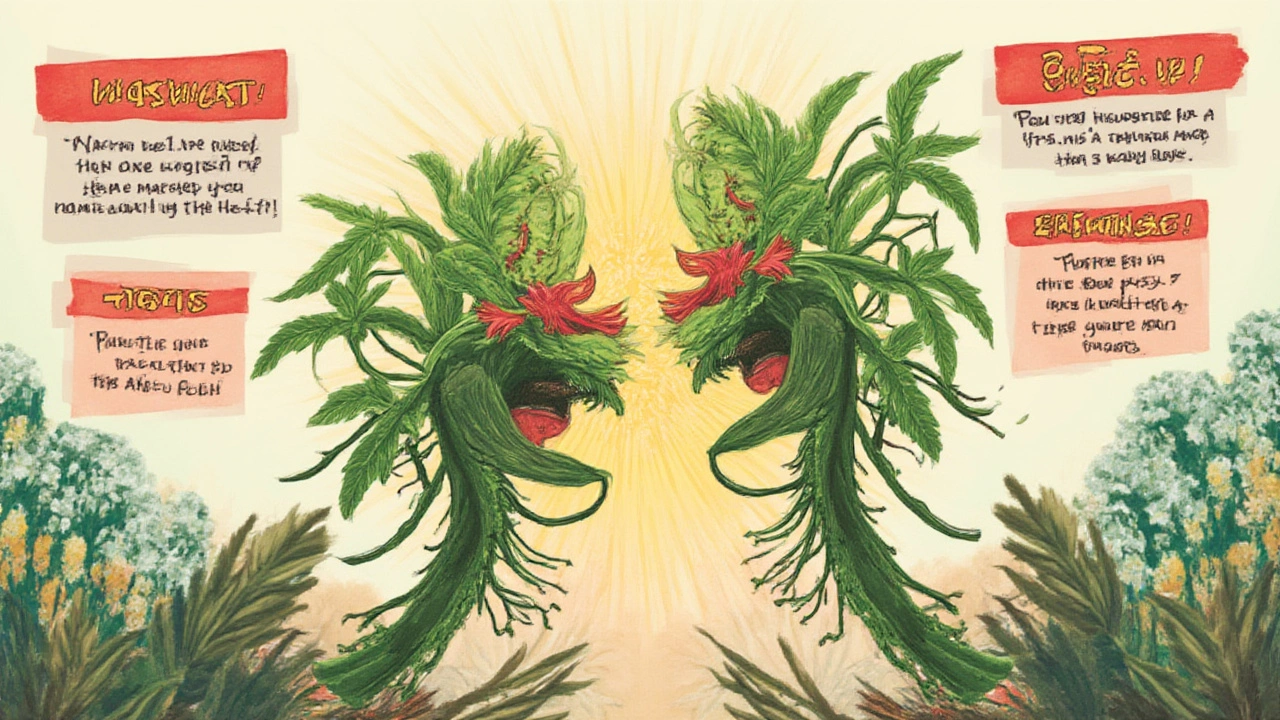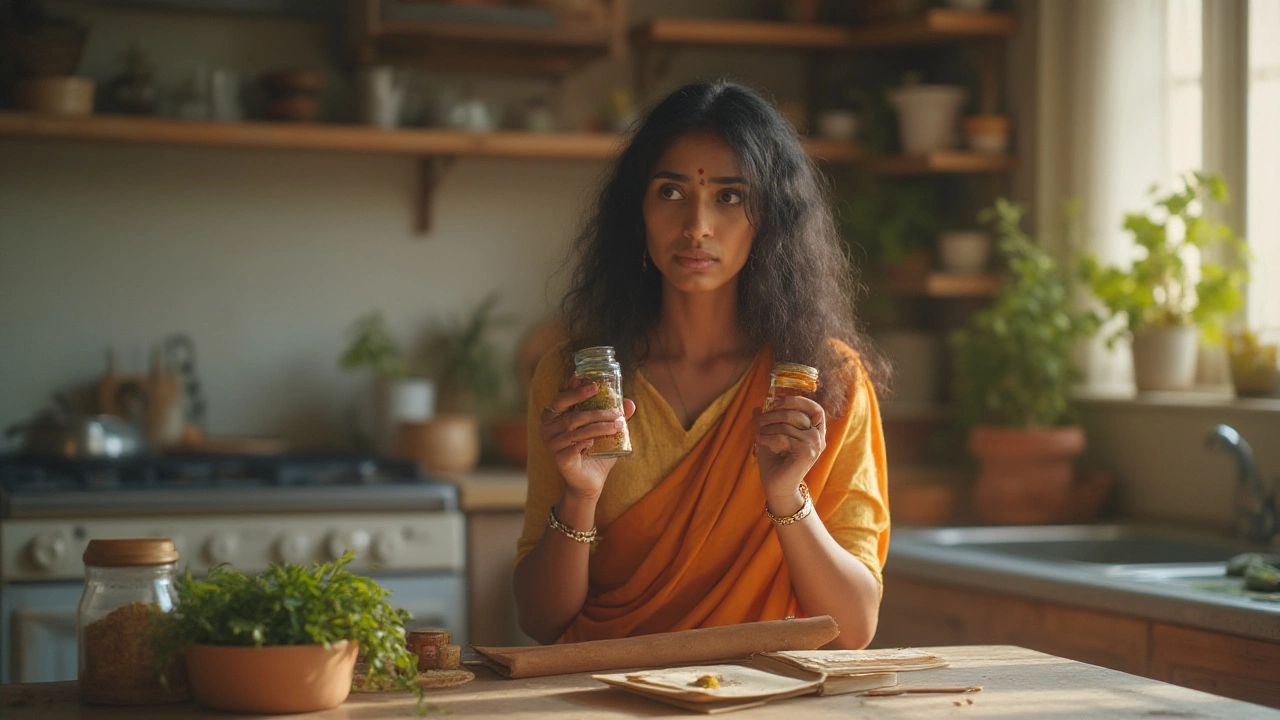Few people realize that just because herbs come from nature, it doesn’t mean they always play nice with each other. Indian grandmas and health influencers might say ‘go natural,’ but mixing certain herbs is more chemistry experiment than home remedy. Dive into your kitchen or open any supplement drawer and you’ll find a stack of bottles—maybe ashwagandha for stress, ginkgo for your memory, valerian for sleep. Sounds harmless enough, but when you put some of these together, they can backfire in unpredictable ways. Some pairings make each other useless, others ramp up side effects, and a few are downright dangerous. One surprisingly common herb, St. John’s Wort, has more drug and herb interactions than many prescription meds. Who would’ve guessed?
Why Mixing Herbs Can Backfire
The world of herbal combinations isn’t like mixing fruit salad—think of it more like chemistry class, but with fewer warning labels. Every herb comes with a unique profile, packed with active compounds that influence how your body works. Some herbs fight inflammation, lower blood pressure, improve mood, or thin blood. Now, imagine doubling up on two blood thinners—ginger and garlic, for example. You might end up with bruises that look like polka dots or, worse yet, a bleeding episode that’s the stuff of ER visits.
The tricky part? Most herbs don’t go through the same rigorous testing as pharmaceuticals. There's little solid research on how some traditional remedies interact when mixed. That’s why, even if each herb does wonders on its own, combinations can surprise both you and your doctor. The body's liver and kidneys, our chemical filters, get swamped when processing herbs that demand the same metabolic pathway. Pile on too many, and the system gets glitchy, sometimes amplifying side effects or, more worryingly, rendering medications useless.
Herbs like St. John’s Wort are notorious for interfering with prescription meds, from antidepressants to birth control pills. Imagine taking ginseng for energy alongside caffeine-rich herbs like guarana, then adding a decongestant for a cold. Hello, rapid heartbeat and shaky hands. It's not so different with sedative herbs. Toss valerian, kava, and hops together and you might feel groggy or dizzy all day, even if you only wanted a better night’s sleep.
Let’s make it practical. Here’s a table that maps out some especially risky herbal pairs, explaining what can go wrong if you mix them.
| Herb 1 | Herb 2 | Risks/Side Effects |
|---|---|---|
| St. John’s Wort | Ginkgo Biloba | Bleeding risk, reduced effectiveness of medications |
| Garlic | Ginger | Increased blood thinning, bruising, bleeding |
| Valerian Root | Kava | Excessive sedation, grogginess, liver stress |
| Ginseng | Caffeine-containing herbs (guarana, yerba mate) | Insomnia, heart palpitations, anxiety |
| Black Cohosh | Red Clover | Hormonal disturbances, liver overload |
| Licorice Root | Dandelion | Dehydration, low potassium, high blood pressure |
The danger zone isn’t just about rare herbs from distant lands—it’s right there in your local store or kitchen spice rack. So, when you grab that blend labeled “detox” or “immune booster,” give it a hard look. The marketing may be inviting, but the science is still catching up.
Top Herb Pairings to Avoid: What Happens When Nature Clashes
Let’s get down to brass tacks: which combinations are best left alone, and exactly why they spell trouble? Start with the heavy hitters. St. John’s Wort, famous for mood support, also speeds up the way your liver breaks down substances. So, if you take it with ginkgo biloba (often used for memory), both can boost the risk of dangerous bleeding, especially if you’re on blood thinners.
Next up—garlic and ginseng. Both sound like a good time for your immune system, but they also lower blood pressure and thin blood. Mixed together? The chance of unsafe drops in blood pressure and the risk of internal bleeding jumps up. Not the kind of 'boost' anyone's looking for.
Mood-boosting and sleep-promoting herbs can make things tricky, too. Valerian, kava, passionflower, and hops all step in to calm your nerves. Double or triple up, and instead of sleeping soundly, you might wake up feeling drugged. Worse, certain combos put too much strain on your liver. There’s a real story from Australia about a woman hospitalized after mixing multiple sedative herbs, even though she stuck to recommended doses. When it comes to liver stress, kava’s been flagged by regulatory authorities in several countries after reports of irreversible damage, especially when combined with other relaxing herbs or alcohol.
Some combinations look harmless on the outside but pack hormonal punches. Black cohosh and red clover, commonly used for menopause, both mess with estrogen pathways. Used at the same time, the risk of hormone-sensitive conditions spikes. For anyone with a family history of breast, ovarian, or uterine cancer, that’s not a gamble worth taking.
If you turn to herbal diuretics like dandelion, licorice root, or nettle, thinking you’ll flush toxins, beware. Licorice amplifies dandelion’s natural potassium-dropping effect, and next thing you know, leg cramps, heart palpitations, or outright arrhythmias show up. Potassium is tricky—too little and your heart skips a beat, literally.
Even something as innocent as green tea can jazz up the effect of ginseng or other energy herbs. That extra energy could quickly turn into shaking, fast heartbeats, or even panic attacks, especially if you’re watching a stressful game or are naturally anxious.
- St. John’s Wort + other antidepressant herbs: high risk of serotonin syndrome (confusion, sweating, high blood pressure)
- Ginkgo + aspirin/NSAIDs or other blood-thinners: bleeding risk ramps up
- Kava + alcohol or other sedatives: nobody wants blackout grogginess or liver emergencies
- Licorice + antihypertensive herbs: can actually raise blood pressure instead of lowering it
- Ginseng + caffeine: cardiac stimulation overload
It’s not that herbs are bad, but our bodies like balance. Some combos tip the scales way further than we ever meant them to go.

Spotting Problematic Combo Symptoms
It’s easy to overlook subtle symptoms when you mix herbs, especially if you think you’re doing something good for your health. The trick is to stay alert for hints that your body isn’t loving the combo. Excessive tiredness, headaches, stomach upsets, constant bruising, or restless sleep may mean you’ve hit a bad mix. Sometimes, issues pop up slowly, so connect the dots if new problems start after adding another herb to the lineup.
Jitters, irregular heartbeats, and anxiety often point to stimulant overload—maybe from ginseng, guarana, or yerba mate with caffeine. If you’re suddenly dealing with nosebleeds or frequent bruises, suspect blood thinning gone too far (often garlic and ginkgo, especially combined with aspirin or ibuprofen). Troubles like dry mouth, blurred vision, and confusion could signal an antihistamine effect from mixing things like valerian, passionflower, or antihistamine meds themselves.
If you ever feel faint upon standing, it could be a sign that blood pressure has plummeted—watch for this if you’re using garlic, hawthorn, or dandelion with antihypertensive drugs or each other. Women noticing unpredictable periods or spotting, especially if using black cohosh, red clover, or dong quai, should be on the lookout for hormone swings.
Liver problems are sneaky but serious. Watch for yellowing of the eyes, fatigue that doesn’t lift, belly pain, or dark urine. Especially stay sharp to these symptoms if you mix kava, valerian, or comfrey with anything else stressing the liver.
No one likes talking about bathroom habits, but sudden changes—diarrhea, constipation, severe cramps—can also mark a bad herbal blend. If you find yourself at the doctor or hospital with a reaction but forgot to mention your herbs, bring it up. Doctors in the U.S. report that nearly 20% of supplement users never tell their medical provider, which can mean slow treatment or missed causes.
If you’re looking for a sign from your body, it’s usually right there—just don’t brush it off as unrelated. Your morning routine could be quietly sabotaging your health if several herbs mix badly in your system.
How to Mix Herbs Safely (If at All)
If this all sounds a little intimidating, that’s justified, but you don’t have to give up on herbs. The secret is smart use and being honest with yourself about your habits. First off, never assume the more, the merrier. Pick the one or two herbs that genuinely fit your needs, not a whole arsenal.
Keep a simple herb diary—write down what you’re taking, how much, when, and why. You’d be surprised how quickly those little capsules, teas, or powders add up. Before trying anything new, check with a pharmacist or doctor—especially if you take regular medications. Some pharmacies now offer herbal supplement interaction checks for free; it’s worth that 5-minute phone call.
When possible, space out herbs with similar effects. Take anti-stress herbs in the evening, energy boosters in the morning, and always avoid doubling up on anything that affects blood pressure, clotting, hormones, or your nervous system. And remember, ‘natural’ doesn’t always mean ‘safe for everyone.’ Genetics, age, gender, and other health problems change how your body reacts.
- Start any new herb at the lowest possible dose
- Watch for side effects and jot them down
- Never mix herbs with the same function without talking to a professional
- Store-bought blends with long ingredient lists are riskier than single-ingredient products
- If you need to stop for surgery, dental work, or a medical procedure, be honest with your provider about every herb
One overlooked tip: always buy herbs from reputable sources that list all ingredients. Avoid anything that says ‘proprietary blend’ without breaking down what’s inside. In a 2023 survey, nearly 35% of Indian herbal supplements had hidden ingredients—sometimes banned substances. So if in doubt, leave it out.
Lab tests for herbs and supplements are rare, but some websites (like consumerlab.com or the US Pharmacopeia) post results. If you’re a research geek, double-check safety stats for your favorite herbs. The best prevention is knowing what you’re swallowing and keeping things simple.
With a little common sense and a lot of respect for nature’s power, you can keep using herbs without making yourself a science experiment. Don’t just trust your favorite Instagram account—double check with your doctor, and stop if you ever feel worse instead of better. When it comes to herbs, it’s not just what you take, but how you mix them that makes all the difference.
